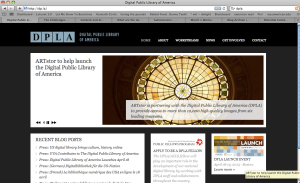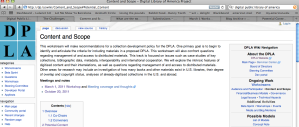Digital Public Library of America defines new digital scholarship
Posted: April 15, 2013 Filed under: Uncategorized | Tags: digital history, digital humanities, digital scholarship, DPLA, historyau 3 CommentsIn 2006, Roy Rosenzweig asked if History could be open source and in 2013 the Radcliffe Institute for Advanced Study answers: “Yes, absolutely.”
On Thursday, April 18th, 2013, the world’s first “large-scale digital public library” will open to the public. Instead of swinging its doors wide and hosting a party, the Digital Public Library of America will go live on Thursday– inviting the Internet community to scan, scroll, and click through thousands of digitized and digitally born materials for free.

“The time is right to launch an ambitious project to realize the great promise of the Internet for the advancement of sharing information and of using technology to enable new knowledge and discoveries in the United States”
The DPLA will not be a Wikipedia-type resource. The library will feature collections of materials already published without inviting users to create, comment, or control the content. However, as Rosenzweig explained that Wikipedia was important not only as a product, but also as a process, I think the same could be said for the DPLA. On it’s own, it will be a great resource for historians, students, and digivisitors alike. However, as a process, the DPLA highlights the ongoing conversations on defining “digital scholarship” and creations of Chuck Tryon’s “networked public spheres”.
The organization created six workstreams as committees working to build the DPLA and answer questions collaboratively. The most important of which included “Audience & Participation” and “Content & Scope”.

“The Content & Scope workstream will identify content and articulate a collection development policy for the DPLA by confronting questions regarding management of and access to distributed materials, research, and data curation. It will undertake research that is relevant to core objectives, collect data concerning how many books and other materials exist in US libraries and their copyright status, and conduct analyses of already-digitized collections in the US and abroad.”
Within the Content & Scope workstream, members designed the “collection development policy” featuring a list of Potential Content. Some of this content are primary sources that have been digitized and some are works that have always been digital. As blogs begin to find a home in the DPLA, the lines between traditional forms of scholarship and blogging begin to blur even more (Tryon). By placing these blogs in a “networked public sphere” (the DPLA), these digital blogs and writing “can combine with the practices associated with scholarly production with the benefits associated with public engagement” (Tyron).
Additionally, the creation of this library can only encourage the process of “crafting scholarship designed specifically for the electronic environment” (Thomas) and taking advantage of these new platforms and audiences. I think the Library will only reenforce Thomas’ ideas of “casting aside the comfortable” to “discover the that the openness of the digital medium is what allows us both to create vibrant new scholarship and speak to a rising generation of students”.
So I wonder, will becoming included in the DPLA add an air of legitimacy to these online blogs, personal or otherwise? Will this affect traditional “professional culture” (Rosenzweig) or redefine the “practices for scholarly communication” (Tryon)? Will online publications, by invitation or not (or I guess by virtue of the Internet, generally not), be considered under the temperamental tenure process if housed in the Digital Public Library of America?
I’ve heard a lot about the DPLA in the past few weeks and I think you make some points that are really relevant to our class. I’m particularly interested in the questions you ask at the end, and especially to see how they play out once the library “opens its doors.”
I second Hallie. Thanks for alerting us to the Digital Public Library. I am also curious if becoming a part of DPLA will provide the legitimacy that some scholars, particularly historians, feel is necessary to establish themselves in the field.
Make that a third! Definitely a development we all need to keep an eye on.